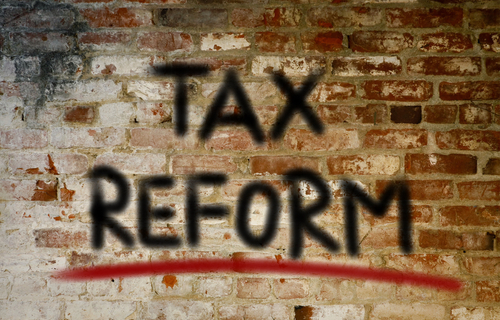Tax Reform Brings New Changes to Section 1202

Tax Reform Brings New Changes to Section 1202
Tax reform is here, love it or hate it. So, with the New Year here that means it’s time to start working under different tax law. To be clear, the 2017 tax year, for which you will file a return this year, is not affected by the recent tax reform passed by lawmakers in Washington. However, going forward in 2018, things are changing. We’ve already discussed several of the most important changes in recent articles. In addition, you can continue to rely on GROCO to keep you up to date on all the latest tax reform happenings.
Learn how they might affect you
What is IRC Section 1202?
To that end, let’s talk about another important change brought on by the Tax Cuts and Jobs Act; it’s official name. The new Act passed by lawmakers in December will have an impact on Qualified Small Business Stock (QSBS), which falls under section 1202 of the tax code 1202. According to Investopedia, Section 1202 is, “A section of the Internal Revenue Code which provides for capital gain from select small business stock to be excluded from federal tax. Section 1202 of the Internal Revenue Code (IRC) only applies to qualified small business (QSB) stock that has been held for more than five years.”
How Does it Work?
This tax break has been around for years, but it only became permanent in 2015 as part of The Protecting Americans from Tax Hikes (PATH) Act. Furthermore, QSBS before or after certain dates, as shown in the table below, may be subject to 50% or even 75% favorable gain exclusion. The unexcluded portion of the gain was still subject to a 28 percent tax. Additionally, when computing your AMT (alternative minimum tax) a portion of the gain excluded for federal income tax was unfavorable adjustment. So effectively, Section 1202 offered lower exclusion percentage to taxpayers. The Small Business Jobs Act of 2010, P.L.111-240, amended Section 1202 in 2010, so QSBS purchased after September 28, 2010, will have entire gain from the sale of a QSBS stock 100 percent eligible for tax exclusion. Essentially, that means you could sell your business for cash and pay ZERO tax on the gain.
Date Acquired Exclusion %
On or before Feb. 17, 2009, 50%
Feb. 18, 2009 – Sept. 27, 2010 75%
Sept. 28, 2010, or later 100%
Who Can Qualify?
Since 2010, Section IRC 1202 has become an additional incentive for non-corporate taxpayers to invest in small businesses. However, with the Tax Cuts and Jobs Act now in place, there are additional changes (Section 199A) to Section 1202 that you should know. First off, only C corporations qualify for Section 1202. Additionally, you have to meet certain criteria, namely:
• Your corporation’s gross assets must be valued no more than $50 million since the timed it was formed until the time right after you receive your stock.
• You must acquire the stock in exchange for cash, property, or services directly from the C corporation.
• The corporation cannot be a disqualified service business. That means it cannot be in certain fields, including law, health, and accounting, or any other business where the principal asset is the skill or reputation of the owner or its employees. The new section 199A requires these business owners to be subject to a complete phase-out on the 20 % business income deduction at $415, 000 for joint filers ($207,500 for single filers).
• You must hold the stock for at least five years before you sell it.
Taxation of Pass-Through Entities
Thus, the same types of businesses that cannot be qualified small businesses (and issue QSBS) under section 1202 are also subject to more restrictive phase-outs for the new business income deduction under section 199A of the 1202 Tax Cuts and Jobs Act. On the other hand, if your QSBS meets all the above criteria and some other than 100% of your gain is excluded from being taxed under Section 1202, with one small caveat. The exclusion is subject to a limit of either $10 million or 10 times the basis of the stock, whichever is greater.
CPA, MBA
We hope you found this article about “Tax Reform Brings New Changes to Section 1202” helpful. If you have questions or need expert tax or family office advice that’s refreshingly objective (we never sell investments), please contact us or visit our Family office page or our website at www.GROCO.com. Unfortunately, we no longer give advice to other tax professionals gratis.
To receive our free newsletter, contact us here.
Subscribe to our YouTube Channel for more updates.

Alan Olsen, is the Host of the American Dreams Show and the Managing Partner of GROCO.com. GROCO is a premier family office and tax advisory firm located in the San Francisco Bay area serving clients all over the world.
Alan L. Olsen, CPA, Wikipedia Bio

GROCO.com is a proud sponsor of The American Dreams Show.

The American Dreams show was the brainchild of Alan Olsen, CPA, MBA. It was originally created to fill a specific need; often inexperienced entrepreneurs lacked basic information about raising capital and how to successfully start a business.
Alan sincerely wanted to respond to the many requests from aspiring entrepreneurs asking for the information and introductions they needed. But he had to find a way to help in which his venture capital clients and friends would not mind.
The American Dreams show became the solution, first as a radio show and now with YouTube videos as well. Always respectful of interview guest’s time, he’s able to give access to individuals information and inspiration previously inaccessible to the first-time entrepreneurs who need it most.
They can listen to venture capitalists and successful business people explain first-hand, how they got to where they are, how to start a company, how to overcome challenges, how they see the future evolving, opportunities, work-life balance and so much more..
American Dreams discusses many topics from some of the world’s most successful individuals about their secrets to life’s success. Topics from guest have included:
Creating purpose in life / Building a foundation for their life / Solving problems / Finding fulfillment through philanthropy and service / Becoming self-reliant / Enhancing effective leadership / Balancing family and work…

MyPaths.com (Also sponsored by GROCO) provides free access to content and world-class entrepreneurs, influencers and thought leaders’ personal success stories. To help you find your path in life to true, sustainable success & happiness. It’s mission statement:
In an increasingly complex and difficult world, we hope to help you find your personal path in life and build a strong foundation by learning how others found success and happiness. True and sustainable success and happiness are different for each one of us but possible, often despite significant challenges.
Our mission at MyPaths.com is to provide resources and firsthand accounts of how others found their paths in life, so you can do the same.
Is the Deal Between Burger King and Tim Horton’s Really an Inversion?
Is the Deal Between Burger King and Tim Horton’s Really an Inversion? If you haven’t heard already, Burger King recently announced its plans to acquire Tim Hortons Inc. a Canadian coffee and doughnut chain. There is nothing wrong with that news in of itself, and depending on whom you ask there is nothing wrong with…
Who is to Blame for USA Companies Leaving the Country for Lower Taxes?
Who is to Blame for USA Companies Leaving the Country for Lower Taxes? Imagine you owned or ran a large company that was making a lot of money. However, instead of seeing all of that money count as profit, you were watching a large portion of it being taken due to the United States bloated…
Qualified Small Business Stock: An Opportunity for Investors
Qualified Small Business Stock: An Opportunity for Investors Updated: 11/16/10 Aiming to give a boost to developing small businesses, Congress granted an unusual tax break, allowing taxpayers who buy newly issued shares of qualified small business stock (QSBS) and hold it for five years to exclude from taxation half of their capital gain realized on…
Are You Still Waiting For Your Tax Refund?
Does it feel like this year is just flying by? The Calendar on your wall is right. The year is almost half over already. Where did all that time go? More importantly, where the heck is your tax return? It’s one thing to still be waiting for your return if you waited to file it…



